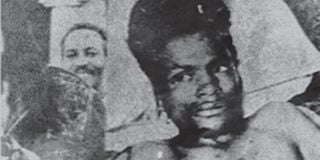The life and times of Mau Mau fighter Dedan Kimathi

The late Mau Mau hero Dedan Kimathi. PHOTO | FILE | NATION MEDIA GROUP
What you need to know:
- Two charges were subsequently brought against him: illegal possession of a firearm and ammunition, and the murder of a Kikuyu home guard.
- His arrest and execution was celebrated by the colonial government who thought it marked a turning point in the struggle for independence.
For the past 56 years, Dedan Kimathi’s name has been synonymous with the freedom struggle.
He dared the colonial government into a war, and was one of the most astute, and perhaps the most celebrated freedom fighters.
Kimathi was seen as a war trophy; his arrest and execution was celebrated by the colonial government who thought it marked a turning point in the struggle for independence.
One senior prison officer who witnessed his hanging described him as a model prisoner: “To the last, he was composed and quiet.”
When the State of Emergency was declared in October 1952, Kimathi was one of the Mau Mau fighters who entered the forest to wage war against the British.
He engaged the British soldiers for almost four years before his capture.
TETU SHOOTING
A confidential profile of Kimathi compiled by the Special Branch at the height of the Emergency describes him as “Councillor and co-ordinator”.
The document says Kimathi “possesse(d) a limited amount of political acumen, and is certainly more far sighted than most gang leaders.”
He was also described as a “tireless walker normally believed to carry a 450 D/B sporting rifle.”
In the early hours of October 21, 1956, Kimathi was captured at Tetu after being shot by Corporal Wanjohi and Tribal Policeman Ndirangu.
He had tried to climb the river bank on the forest side but it was too steep. He ran back and climbed up on the other side when a bullet hit him in the thigh. This spot in Kahigaini village, Nyeri County, is now almost a shrine.
A few metres away stands a neglected concrete monument painted in national colours, marking the location where Kimathi was captured.
CAPITAL SENTENCE
Although it was gazetted as a national monument in 2001, this historic site, now inside the Nyayo Tea Zones, looks abandoned and silent.
While Kimathi is a celebrated Mau Mau war hero, few tourists visit. The shrine only attracts attention during the commemoration of his execution.
Kimathi’s capture was announced over loudspeakers in many parts of Kenya. Princess Margaret, who was asleep at the Stanley Hotel, was informed during the day by Gen Gerald Lathbury, the British Army Commander for Africa.
Dr PP Turner, who conducted surgery on Kimathi’s thigh, would later inform the court that Kimathi suffered a series of prolonged seizures during the operation.
Two charges were subsequently brought against him: illegal possession of a firearm and ammunition, and the murder of a Kikuyu home guard.
He was tried by the Supreme Court in Nyeri on the former charge first, and since a conviction carrying the capital sentence was obtained, the latter charge was not proceeded with.
APPEAL REJECTED
His appeal to the Court of Appeal for Eastern Africa was summarily dismissed on December 27, 1956, and the Judicial Committee of the Privy Council in London refused his petition to appeal to the Council on February 14, 1957.
While the sentence was considered a reprieve by the white settlers in Kenya, in Britain there was a daily flow of telegrams and petitions to the Colonial Secretary from left wing politicians, private citizens, human rights activists, and trade unionists who demanded a reprieve for Kimathi.
Salisbury Constituency Labour Party pointed out. “We feel very strongly that the British Government and white settlers in Kenya are, to a very large extent, responsible for what has happened in the Colony.” The Colonial Secretary refused to intervene.
Kimathi was executed in Kamiti Prison just 48 hours after his leave of appeal was rejected. Roman Catholic Priest Fr Joseph Whelan was with Kimathi the night before.
"The first time I saw Kimathi I told him that he could do more for his people now than any time. He asked me how and I said, ‘you can offer yourself to God for all the harm you have done and for the sake of your people’. This morning, shortly before I left him, he asked me to repeat that,” the priest added.






